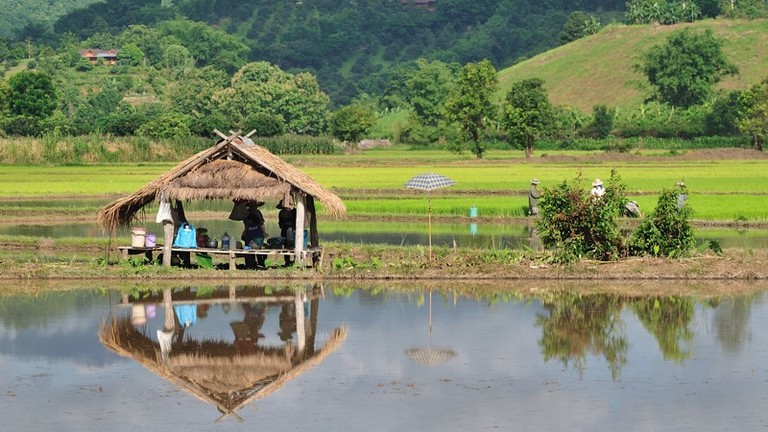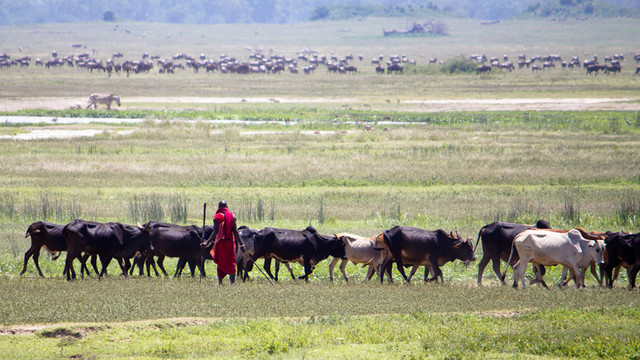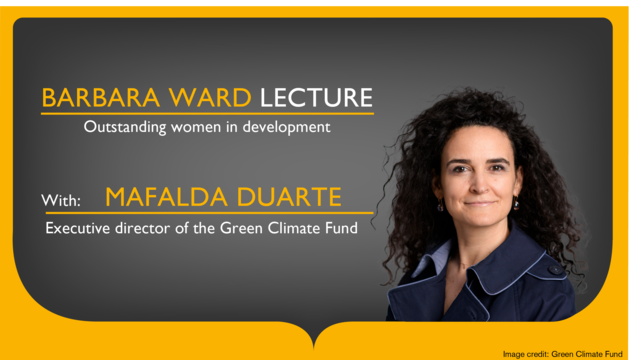CBA17: back in person, ready to harness energy to drive forward the locally led adaptation agenda
The international conference on community-based climate adaptation will cover climate finance, nature-based solutions, youth-led initiatives and innovation. This year’s new theme, decolonising climate action, will add a new dimension to the event.



Farmers in Chiang Rai, Thailand (Photo: Guillermo Fdez, via Flickr, CC BY-NC-ND 2.0)
This year’s international community-based adaptation conference (CBA17) will be our first in-person conference since 2019.
During the pandemic we took CBA online. These virtual events provided crucial space for more learning and sharing of ways to enable locally led adaptation – including putting the principles for locally led adaptation (LLA) into practice.
But there is no substitute for the personal connections and deeper thinking of face-to-face interactions.
Five themes will shape the CBA17 agenda, each framed to encourage discussions that bridge different sectors and areas of expertise.
Four of the themes are:
- Climate finance: we will focus on how climate finance delivery mechanisms can be transparent and deliver locally led adaptation at scale, while sharing risks equitably between donors, intermediaries and recipients. We will reimagine ways to deliver climate finance that enables flexibility, and innovative approaches to strengthen locally led adaptation
- Nature-based solutions: we will examine how nature-based solutions − solutions that work with nature to protect, sustainably manage, or restore natural ecosystems while building resilience to climate change impacts − can support climate adaptation that meets the needs and priorities of rural and urban communities
- Youth driving LLA: led by youth organisations, we will explore how youth can lead locally led adaptation, demonstrating scalable and inclusive youth initiatives and how they can mobilise the resources needed for transformative action, and
- Innovation: we will unpack how innovation can be financed and inform adaptation in the formal and informal private sectors – ranging from producer cooperatives to fully established businesses.
Shifting power
The challenge of addressing entrenched power imbalances has surfaced repeatedly in discussions at past CBA events.
It’s clear that citizen engagement and participation in climate-related decision-making can dramatically shift and strengthen the response to climate risk. This goes hand in hand with recognising the power of local knowledge, and communities’ proven success in leading and implementing effective adaptation solutions.
Despite the ambition, and growing recognition that local communities – when they exercise their power, take control of their own environments and have the right resource – can drive sustainable and effective adaptation, there is collective failure globally to deliver climate action at scale and in the places that it is most needed.
Slowing the pace of change are colonial legacies that directly and indirectly continue to shape climate responses, reinforcing power imbalances between actors in the global North and global South. Indeed, the IPCC in its 6th assessment report for the first time highlighted “ongoing patterns of inequity such as colonialism” as a driver of vulnerability of ecosystems and people to climate change.
Climate action is hamstrung by power imbalances rooted in colonialism, evident when looking across themes for CBA17. For example:
- The high carbon economies driving climate impacts that disproportionately affect the global South are failing on their moral obligations and public commitments to raise and transfer climate finance
- Indigenous Peoples have practiced nature-based solutions to climate change for centuries, and understand and manage their environment better than any external actors. Yet violent exclusion of Indigenous Peoples from protected areas continues
- Youth continue to face intergenerational injustices, often excluded from meaningful climate decision-making and action, despite their education, digital and technology skills, and their ability to galvanise awareness and action in both local and online communities, and
- Innovations and technologies, often driven by organisations and businesses in the global North, can exclude local knowledge and increase vulnerability and marginalisation of some groups.
Addressing power imbalances in CBA to enhance locally-led climate action
This year, reflecting requests of the CBA community, we’re introducing a fifth theme: decolonising climate action.
It will include sessions that explore climate colonialism – the processes through which the unjust legacies, racism and systemic exclusion established by colonialism are maintained by the actions or inactions of former colonial countries. The theme will explore where it comes from and ingrained narratives and stories that can challenge the systems that slow progress.
The sessions will draw on the expertise and lived experiences of our partners including Care and Slum Dwellers International. These organisations are exploring how to mobilise finance and influence government decision-making through locally-driven knowledge gathering and fundraising. Both organisations are exploring decolonising approaches and ways to shift power in adaptation and development.
We need to engage in uncomfortable conversations to name what is not working and to define accountability and responsibility measures, so we can, collectively, change the status quo.
As a CBA community of practice, we must challenge ourselves to consider how we continue to learn and dismantle colonial legacies that continue to undermine progressive climate action due to power imbalances. Exploring our own failings can be uncomfortable – but discomfort is a motivator for deep reflection and the catalyst for seeking support from likeminded colleagues and collaborators to explore new equitable approaches to addressing climate and development challenges.
Our hope is that by bringing together practitioners, activists, funders, researchers, INGOs and donors, we will bring new insights to the surface while challenging our own assumptions and ways of working.
Discomfort can also reinvigorate the drive for change. We’ll collect the key messages from all five themes and use them to shape the way we talk to donors and those who continue to hold power in the adaptation landscape.
CBA17 will be a platform for practitioners with deep experience to articulate their perspectives, which the broader community of practice, especially global South organisations, can amplify in spaces where the powerful continue to meet – such as international climate and biodiversity negotiations, the Adaptation Futures and Gobeshona conferences, and in their own discussions with donors and NGOs.


